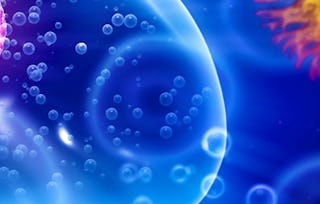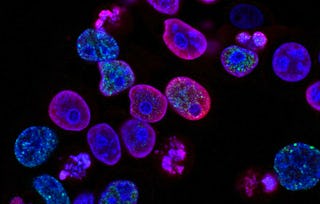Build a strong foundation in biological sciences—from molecular mechanisms to complex physiological systems. This course covers essential concepts in cell biology, genetics, and human anatomy, providing practical frameworks to explore life processes through scientific inquiry and experimentation.

Gain next-level skills with Coursera Plus for $199 (regularly $399). Save now.

Recommended experience
What you'll learn
Recognize the scientific principles underlying life and biological organization.
Explain how cell structure and biomolecules support life functions.
Analyze how genetics and evolution drive diversity among organisms.
Evaluate ecological relationships and environmental interactions in living systems.
Skills you'll gain
Details to know

Add to your LinkedIn profile
November 2025
159 assignments
See how employees at top companies are mastering in-demand skills

There are 10 modules in this course
In this module, you will learn the structure and functions of the cells, the major categories of cells, and the cell theory. you will also understand the structure and function of many cell organelles such as the plasma membrane, cell wall, nucleus, endoplasmic reticulum, Golgi apparatus, the endomembrane system lysosomes, central vacuoles, chloroplast mitochondria, ribosome, cytoskeleton, flagella and cilia in cell growth and function.
What's included
17 videos16 readings14 assignments
In this course, you will learn the structure and functions of the cells, the major categories of cells, and the cell theory. You will also understand the structure and function of many cell organelles such as the plasma membrane, cell wall, nucleus, endoplasmic reticulum, Golgi apparatus, the endomembrane system lysosomes, central vacuoles, chloroplast mitochondria, ribosome, cytoskeleton, flagella and cilia in cell growth and function.
What's included
15 videos15 readings17 assignments
In this module, you will learn about autotrophs and heterotrophs, salient features of aerobic respiration, and the major processes involved in it, namely: Glycolysis, the Krebs cycle (Citric Acid Cycle), and the Electron Transport Chain. You will also learn about the concept and the two major types of anaerobic respiration (lactic acid fermentation in human muscle cells and alcoholic fermentation in micro-organisms). Lastly, you will learn about photosynthesis, the most important energy transformation reaction that is crucial for the existence of life on the planet.
What's included
15 videos15 readings17 assignments
In this module, you will learn how nucleic acids DNA (deoxyribonucleic acid) and RNA (ribonucleic acid) serve as genetic material along with their structure and functions. You will also learn how DNA replicates, and genetic information flows from DNA to RNA to protein, through the processes called transcription and translation, different types of mutations and mutagens that cause mutations. Lastly, the module talks about why and how genes are regulated in prokaryotes and eukaryotes, and different infectious agents, such as viruses, viroids, bacteriophages, and prions.
What's included
16 videos16 readings18 assignments
In this module, you will learn about recombinant DNA technology and how it is employed in the field of genetic engineering to study gene functions, synthesize therapeutic proteins, resolve disputes or solve criminal cases as part of forensic sciences, and genetically modify organisms to improve their traits. Along with the applications of biotechnology, we also discuss the ethical/regulatory concerns. This module also introduces you to cancer biology with a focus on the types of genes involved in causing cancer, the progression of cancer, and preventive measures. Lastly, you will be introduced to the field of computational biology/bioinformatics, which is an interface of biology and computer science that involves analyses of large data sets of genome and protein sequences.
What's included
16 videos16 readings18 assignments
This module deals with the details of cell division. We will understand the two different types of cell division: mitosis and meiosis. Specific topics in this module will include: a) Cell cycle and mitosis; b) Stages of mitosis; c) Cancer and cell cycle; d) Meiosis--stages and generation of genetic diversity; e) Chromosomal abnormalities; f) Genetic basis of cancer.
What's included
13 videos13 readings15 assignments
In this module, we will be studying about the way characteristics and traits are inherited from one generation to another. Different inheritance patterns will be covered. Mendelian genetics: laws of heredity; extensions to Mendel; other influences on phenotype will also be discussed.
What's included
13 videos13 readings15 assignments
This module discusses the unifying concepts of animal structure and function; how material exchange takes place in multicellular organisms; how homeostasis is maintained inside the living beings; and how the circulatory, digestive, respiratory and excretory systems work.
What's included
12 videos12 readings14 assignments
This module describes how different systems in humans coordinate, collaborate, and work together through different systems of communication to control various body processes, such as the ability to respond to stimulus, to reproduce, and maintain immunity. The reading also discusses the complex and unifying concepts of animal structure and functions involving the nervous, sensory, locomotor and hormonal systems.
What's included
14 videos14 readings15 assignments
This module deals with the complex mechanisms of human immunity, human development, and reproduction. The body’s defense mechanisms in fighting infections and their protective role will be discussed. Human reproductive anatomy, functioning, and reproductive health will also be discussed. This unit also covers human development, starting from fertilization to fetal development and birth.
What's included
14 videos15 readings16 assignments
Instructor

Explore more from Basic Science
 Status: Free Trial
Status: Free TrialLecturio
 Status: Preview
Status: PreviewUniversity of North Texas
 Status: Free Trial
Status: Free TrialUniversity of Colorado Boulder
 Status: Free Trial
Status: Free TrialUniversity of Colorado Boulder
Why people choose Coursera for their career





Open new doors with Coursera Plus
Unlimited access to 10,000+ world-class courses, hands-on projects, and job-ready certificate programs - all included in your subscription
Advance your career with an online degree
Earn a degree from world-class universities - 100% online
Join over 3,400 global companies that choose Coursera for Business
Upskill your employees to excel in the digital economy
Frequently asked questions
To access the course materials, assignments and to earn a Certificate, you will need to purchase the Certificate experience when you enroll in a course. You can try a Free Trial instead, or apply for Financial Aid. The course may offer 'Full Course, No Certificate' instead. This option lets you see all course materials, submit required assessments, and get a final grade. This also means that you will not be able to purchase a Certificate experience.
When you enroll in the course, you get access to all of the courses in the Specialization, and you earn a certificate when you complete the work. Your electronic Certificate will be added to your Accomplishments page - from there, you can print your Certificate or add it to your LinkedIn profile.
Yes. In select learning programs, you can apply for financial aid or a scholarship if you can’t afford the enrollment fee. If fin aid or scholarship is available for your learning program selection, you’ll find a link to apply on the description page.
More questions
Financial aid available,

